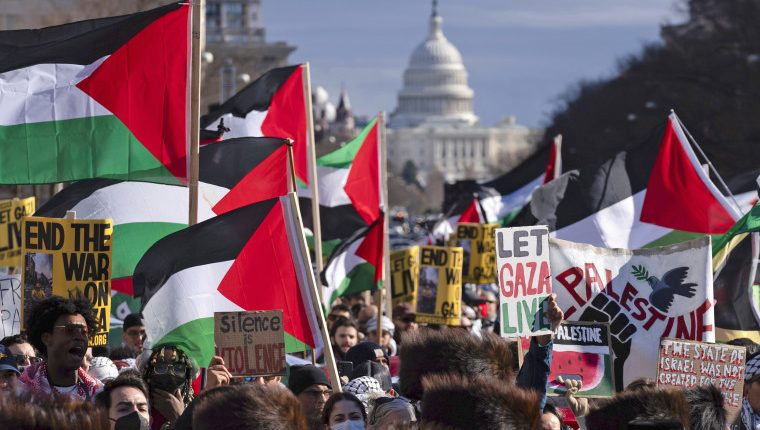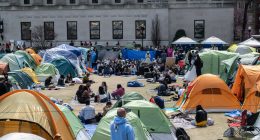TEL AVIV — One hundred days ago, Hamas terrorists evaded Israeli security and surveillance to pierce the fence enclosing the Gaza Strip.
Under cover of a barrage of rockets that began before dawn, they stormed into Israel in pickup trucks, motorcycles and paragliders carrying out a vicious, hourslong assault that resulted in more than 1,200 people killed, according to Israeli officials. Another 240 people were taken hostage, with more than 100 still in Hamas’ captivity.
Israel responded to the surprise attack with amilitary onslaught on Gaza in what has become one of the most destructive wars in recent history, killing Palestinians at an average of about 250 a day — a rate unseen in previous conflicts. So far, about 24,000 people have been confirmed killed, with thousands more buried under the rubble and presumed dead.
The violence has displaced the vast majority of Gaza’s 2.2 million people and is driving widespread hunger and devastation. The ongoing assault is inflaming tensions, threatening to pitch the region into a wider war, and polarizing global politics and populations.
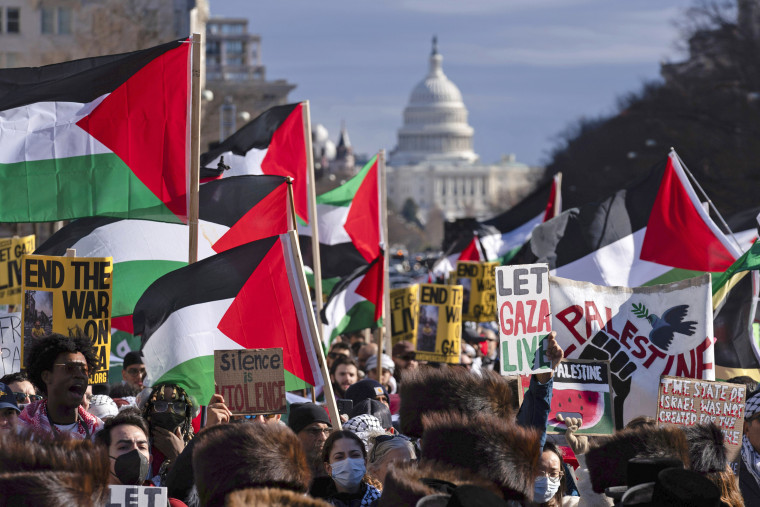
Protests erupted around the world this weekend — including in Washington, D.C., London, Bangkok, Jakarta, Sydney and Johannesburg — calling for an end to the war as the conflict reached the bitter milestone of 100 days.
In Israel, thousands of people gathered in Tel Aviv for a 24-hour rally marking 100 days since the devastating Oct. 7 Hamas attack that sparked what has become the longest and deadliest conflict between Israel and Palestinians since Israel’s establishment in 1948.
‘100 days… I can’t believe it’
The words “bring them home” rang through central Tel Aviv as the families of those held hostage and thousands of supporters gathered in the streets calling on the Israeli government and the international community to do more to see their loved ones released.
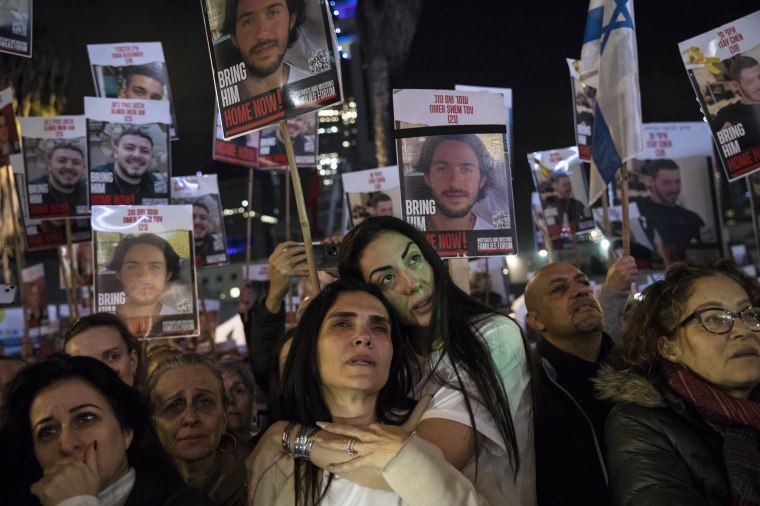
“I never thought I would get to this day,” said Ella Ben Ami, whose parents were taken hostage from their home in Be’eri, a kibbutz in southern Israel miles away from the Gaza border. Her mother, Raz Ben Ami, was one of dozens of hostages released by Hamas in November, and her father, Ohad Ben Ami, remains in captivity.
“A week after the 7th of October, I was like … I can’t believe it’s been a week without my parents,” Ben Ami, 23, told NBC News on Saturday in “Hostages Square” — a plaza that has become a gathering place for families of those held hostage in Gaza. “So, 100 days… I can’t believe it.”
“It’s hard to keep the hope so many days. It’s hard to keep optimistic so many days,” said Ben Ami. She said her mother, who is still recovering from her time in captivity, “can’t sleep at night” and struggles to eat and drink “because she’s all the time thinking about my dad.”
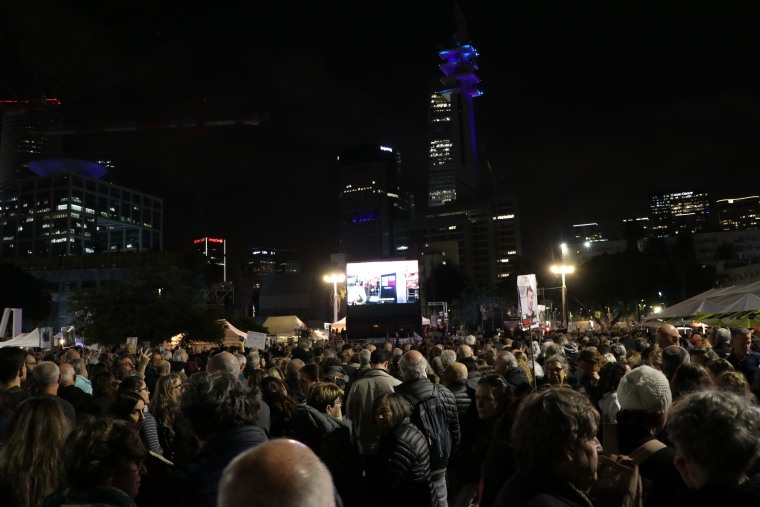
‘100 days of fear’
Inside Gaza, the 100-day milestone marks 14 weeks of relentless attacks from Israeli forces by land, air and sea.
Roughly 85% of the more than 2 million people living in Gaza have been displaced by the war, while much of the enclave’s infrastructure, including homes, schools, hospitals and cultural landmarks — has been destroyed in Israel’s offensive, according to United Nations estimates.
In the midst of the fighting, much of the Gaza Strip has been plunged into a spiraling health crisis, with limited access to food, clean drinking water and medical supplies.
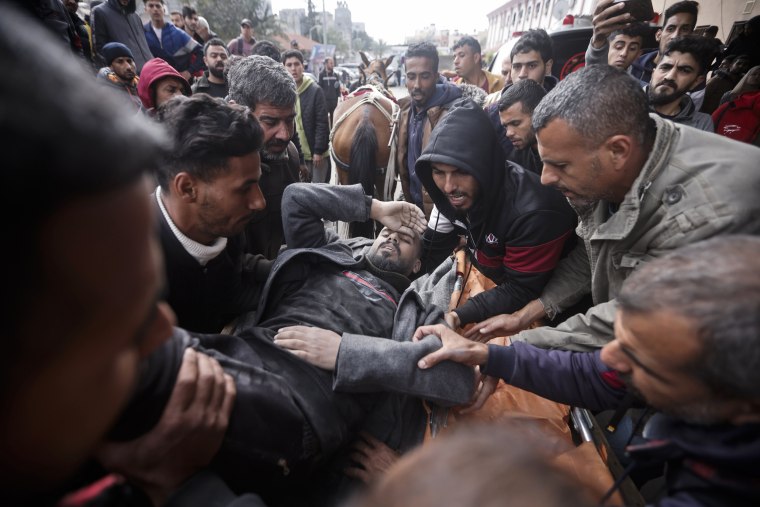
“I want to say that every 30 or 20 minutes, I would be exposed to death — either physically, morally, or psychologically,” said Maher Mahmoud Daowd, a 33-year-old father whose family was forced to flee their home in Khan Younis to seek relative safety further south in Rafah, near Gaza’s border with Egypt.
Not long ago, the Israel Defense Forces had designated Khan Younis a safe zone, ordering thousands of people in northern Gaza to evacuate the area to the city in the south. But as Israel expanded its offensive across southern Gaza, Khan Younis has also become a battle zone, making Rafah one of the few places where displaced Palestinians can find limited refuge, though the IDF continues to bomb that city too.
Daowd, a cultural activities coordinator who, before the war, was working toward obtaining a Ph.D. in literature, said he, his wife, who was also pursuing a Ph.D. in international humanitarian law, and their five-year-old son fled from Khan Younis after their neighbor’s home was hit in a strike.
“I’ll never forget my wife’s scream when she called me,” he said. “Imagine you are sitting and waiting for the rocket; you hear the rocket coming down to strike you, your house, your family, your neighbors, or the place where you reside.”
“One hundred days are entirely missing from my life,” Daowd said. “Imagine 100 days without safety, food or water … 100 days of fear, 100 days of losing your friends, 100 days and you hear every day the shelling or the collapse of a building, a restaurant you like — 100 days without traveling, 100 days without work, 100 days of the war.”
With many families sleeping in makeshift tents in Rafah, cooling temperatures and the onset of winter rains have only exacerbated a mounting humanitarian crisis that has worsened as the months wear on as aid continues to fall short.
Daowd and his family might be considered lucky to have found shelter with 14 other relatives in “an ordinary house that would barely take seven people.” But the cramped conditions pose a daily challenge, he said, while food and water are difficult to come by, along with medication and other essential supplies.
“We can’t find Pampers for the babies. Even if you find them, it is expensive,” he said.
“The massive death, destruction, displacement, hunger, loss, and grief of the last 100 days are staining our shared humanity,” Philippe Lazzarini, commissioner-general of UNRWA, the U.N. agency for Palestinian refugees, said in a statement on Saturday.
“It’s been 100 days since the devastating war started, killing and displacing people in Gaza, following the horrific attacks that Hamas and other groups carried out against people in Israel. It’s been 100 days of ordeal and anxiety for hostages and their families,” he said.
‘No one will stop us,’ Netanyahu says
Last week, Israel faced accusations of genocide over its campaign in Gaza at the International Court of Justice in the Hague in a case brought by South Africa.
The case, which continues to play out, could see the ICJ order Israel to halt its offensive in Gaza. While the court’s rulings are binding under international law and can have major significance politically, it lacks the power to enforce them.
South Africa accused Israel of killing, injuring and displacing civilians and curbing access to food, water and necessities in a way that is “intended to bring about the destruction of a substantial part of the Palestinian national, racial and ethnic group.”
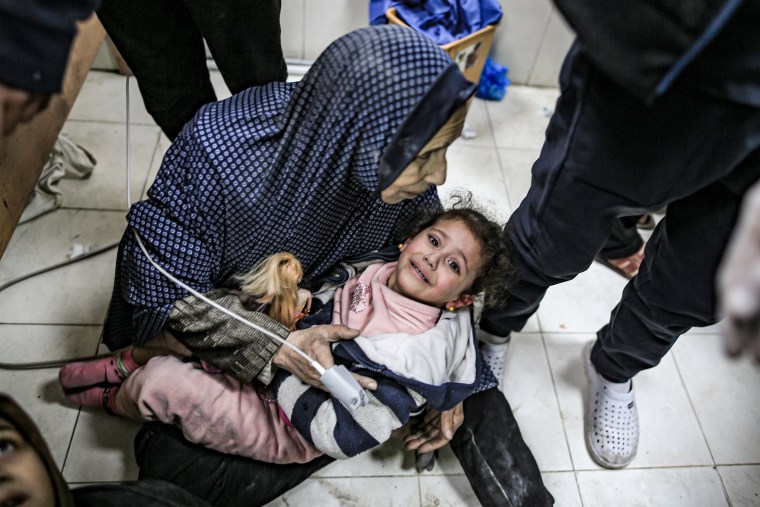
Israeli lawyers said the accusations painted a “partial and deeply flawed picture” of Israel’s actions in the Gaza Strip. And on Saturday, Israeli Prime Minister Benjamin Netanyahu remained defiant, saying the court battle would do little to stop Israel’s fight in the enclave.
“We are continuing the war to its conclusion — to total victory, until we have achieved all of our objectives: the elimination of Hamas, the return of all our hostages and the guarantee that Gaza will never again pose a threat to Israel,” he said. “We will restore security, both in the south and in the north. No one will stop us — not The Hague, not the Axis of Evil, nor anyone else.”
A region on edge
As the war rages, fears within the international community of a wider conflict in the Middle East have grown. Tensions continue to mount on Israel’s border with Lebanon, with regular exchanges of fire between the IDF and Hezbollah, the powerful Iran-backed militant group that controls much of Lebanon’s south.
In the early hours of Friday local time, the U.S. and Britain launched strikes on Yemen against the Houthis, the rebel group also backed by Iran, which has been firing missiles at ships in the Red Sea — a key international shipping lane — in support of Hamas and Palestinians in Gaza.
“Those fears are not misplaced,” Elisabeth Kendall, head of Girton College at the University of Cambridge and an expert on Yemen and the broader Middle East, told NBC News in a phone interview on Thursday.
“It is a very volatile situation,” she said, adding: “It could easily spiral out of control.”
The U.S. conducted another, unilateral strike in Yemen early Saturday local time.
The Houthis, who control much of Yemen, have vowed retaliation for the strikes and Kendall said they are not an “adversary to be underestimated.”
The group has outlasted years of strikes in an almost decadelong war against a powerful and well-resourced Saudi-led coalition.
President Joe Biden has said the U.S. will respond further if the rebel group continues “this outrageous behavior” in the Red Sea.
Daowd said that despite often limited internet connectivity in Gaza, Palestinians in the enclave were anxiously watching how the war is playing out on the global stage.
“I wish the war would not expand,” Daowd said. He said he hoped to see an end to the current conflict, but also hopes for a “radical solution to the Palestinian cause,” which for many is the long-held vision of an internationally recognized independent Palestinian state, partly in Gaza.
“Are there going to be more than 100 days of war, killing, death and displacement? Or will there be solutions?” he said. “God willing, we hope for things to change.”
Source: | This article originally belongs to Nbcnews.com
